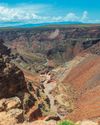
BBC Sky at Night Magazine
Saturn's ring has space rainbows
Water-ice spouting from moon Enceladus is creating peculiar striped bands of light in Saturn's E ring
2 min |
September 2025

BBC Sky at Night Magazine
One sky - then, now and forever
The starry sky is the one unchanged view we share with our ancestors, says Mark Westmoquette. It's our link to every soul who ever paused to wonder
2 min |
September 2025

BBC Sky at Night Magazine
JUNO: The mission that rewrote the story of Jupiter
As NASA's Juno mission nears its end, Nicky Jenner explores the secrets it has uncovered about the Solar System's largest and most enigmatic world
8 min |
September 2025

BBC Sky at Night Magazine
How to make a planet
From stardust to rocky realms and gas giants, here's what it takes to build a world
4 min |
September 2025

BBC Sky at Night Magazine
SKILLS FOR STARGAZERS
How to guide your gear with PHD2: Guiding can make or break your long exposures. Here's how to master it
2 min |
September 2025

BBC Sky at Night Magazine
Astronomers find Universe's missing matter
Cosmic radio signals reveal the shadow of material lost in intergalactic space
1 min |
September 2025

BBC Sky at Night Magazine
Earth may be at the centre of a huge void
New theory could explain why the Universe expands faster in our region of space
1 min |
September 2025

BBC Sky at Night Magazine
111 Places in Space that You Must Not Miss
Perusing the shelves of your local bookstore, you'll no doubt find a vast selection of guidebooks highlighting must-see attractions in cities and countries around the world, demonstrating our species' obsession with travel.
1 min |
September 2025

BBC Sky at Night Magazine
ON1 Photo RAW 2025.2 software
Skip the app-hopping rigmarole: edit and sort your shots in one streamlined space
3 min |
September 2025

BBC Sky at Night Magazine
Eclipse España One country, three years, three eclipses
The total solar eclipse in 2026 is Spain's first in over a century, kicking off a remarkable 18 months of Spanish Moon-shadow fever. Jamie Carter is your tour guide
5 min |
September 2025

BBC Sky at Night Magazine
First light for Vera Rubin Observatory
New science facility captures cosmic phenomena on unprecedented scales
1 min |
September 2025

BBC Science Focus
Electric vehicle boom could hit major roadblock in just 5 years
With sales skyrocketing, a shortage of a critical material could halt progress
1 min |
Summer 2025

BBC Science Focus
Removing microplastics: possible, necessary or just the latest celebrity trend?
Services claiming to clear microplastics from people's bodies have begun to crop up. But how effective are they? An expert explains...
5 min |
Summer 2025

BBC Science Focus
Our meat could soon be gene-edited. Should we be worried?
Genetically edited pork could be on the market within a year. Here's what you need to know
5 min |
Summer 2025

BBC Science Focus
Killer whales filmed using tools for the first time
The marine mammals use kelp to groom each other
1 min |
Summer 2025

BBC Science Focus
THE HORSESHOE CRAB
Millions of years before dinosaurs began roaming Earth, strange-looking creatures were scuttling across the seabed. They looked like they were wearing spiked helmets, with little eyes on top and a sharp tail sticking out the back. The horseshoe crab still exists today and belongs to an order of animals known as Xiphosura, from ancient Greek words meaning 'sword' and 'tail'. Despite their name, they're not actually crustaceans, but more closely related to spiders.
2 min |
Summer 2025

BBC Science Focus
US military could slash a whole country's emissions, finds study
The world's largest fighting force is also one of its biggest emitters
3 min |
Summer 2025

BBC Science Focus
Marbled masterpiece
LENA DELTA RESERVE, RUSSIA
1 min |
Summer 2025

BBC Science Focus
DEAFNESS AND DEMENTIA... WHAT HAVE YOU HEARD?
THERE'S A LOT OF NOISE BEING MADE ABOUT A POSSIBLE LINK BETWEEN HEARING LOSS AND DEMENTIA. BUT WHAT DOES THE SCIENCE HAVE TO SAY?
8 min |
Summer 2025

BBC Science Focus
Can you live longer by eating less?
From fasting to low-protein diets, the evolving science of dietary restriction might just offer the key to slowing ageing
6 min |
Summer 2025

BBC Science Focus
THE PLANETS THAT SHOULDN'T EXIST
With sapphire waterfalls, lava rain and orbits around dead stars, these distant worlds push the limits of what's possible
8 min |
Summer 2025

BBC Science Focus
IS THERE ANYTHING ON EARTH THAT COULD WITHSTAND CONDITIONS ON MARS?
Mars is a pretty horrible place for any creature used to life on Earth. The average surface temperature is -63°C (-81°F) and doesn't reach above freezing anywhere except right on the equator, during the summer.
2 min |
Summer 2025

BBC Science Focus
These are the worst ChatGPT prompts for the environment, study claims
Politeness perhaps does have a cost, as far as the planet's concerned
1 min |
Summer 2025

BBC Science Focus
WHY DO MORE PERIMENOPAUSAL WOMEN GET DIAGNOSED WITH ADHD?
The increase in ADHD diagnoses among peri- and postmenopausal women is likely due to a combination of hormonal changes and better recognition of how ADHD presents in women.
1 min |
Summer 2025

BBC Science Focus
HOW DO I KNOW WHEN TO LET GO OF PAST GOALS OR DREAMS?
Many of us harbour deep ambitions that are an essential part of how we see ourselves - perhaps you fantasised about becoming a successful novelist or professional athlete, or to settle down and start a family.
1 min |
Summer 2025

BBC Science Focus
Bots on Centre Court?
Robot sporting events could become more common in the coming years. But how many of us will be tuning in to watch?
3 min |
Summer 2025

BBC Science Focus
First commercial space station is readying for launch
For the first time in human history, a space station built by a startup, not a nation, is set to enter low Earth orbit
4 min |
Summer 2025

BBC Science Focus
Not-so-grey matter
This is a brain. It may not be immediately recognisable as such – it's far from the pink and wrinkly blob most of us are used to seeing – but it's a brain nonetheless.
1 min |
Summer 2025

BBC Science Focus
Bon appétit!
SOUTH GEORGIA ISLAND, SOUTH ATLANTIC OCEAN
1 min |
Summer 2025

BBC Science Focus
Mysterious 'surge' under Earth's crust could reshape world map, study claims
The pulsing will eventually rip Africa apart and create a new ocean
2 min |
